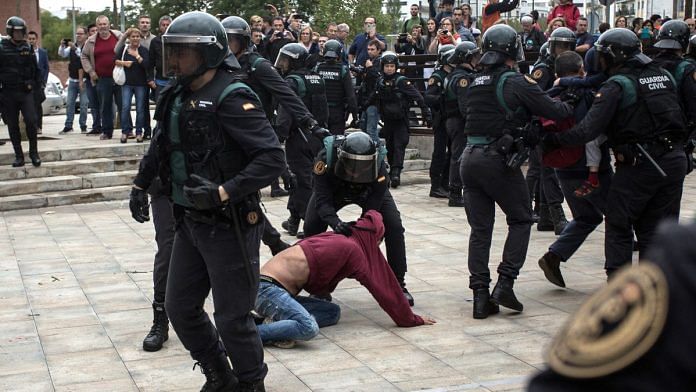Half referendum
Is Carles Puigdemont, the secessionist leader of Catalonia, a reckless opportunist determined to destroy the middle ground where any answers lie. That is the question Roger Cohen asks in his essay in The New York Times.
Catalonia’s 7.5 million inhabitants have legitimate grievances. Yet, a Catalan declaration of independence on the basis of last week’s referendum would lead directly to violence, writes Cohen.
The referendum was not only in violation of court orders and the government in Madrid, but also in defiance of half the population of Catalonia, who do not favor independence. “The result — 90 percent of voters unsurprisingly favored independence — is pretty much meaningless in the circumstances. The secessionist referendum was a sham. It ignored the silent half of Catalonia. That hasn’t stopped Puigdemont intimating the possibility of a declaration of Catalan independence (an invitation to open conflict) before saying he does not plan a traumatic split.”
“The Catalan lurch is of its time. Yes, it’s about Catalan self-determination. But it’s also of a piece with the anti-establishment, anti-elitist, disruption-at-any-cost upheavals that have been buffeting and undermining the postwar liberal order in Europe.”
Please, learn from our experience: Australia to America
“A country in some ways so much like our own, but in its love affair with the gun so utterly alien,” is how The Sydney Morning Herald editorialises the Las Vegas shooting.
“We point over and over to our own success with gun control in the wake of the Port Arthur massacre, that Australia has not seen a mass shooting since and that we are still a free and open society. We have not bought our security at the price of liberty; we have instead consented to a social contract that states lives are precious, and not to be casually ended by lone madmen. But it is a message that means nothing to those whose ideology is impervious to evidence.”
“Even before the full scale of Sunday’s slaughter was known, the US gun lobby was swinging into action, framing this as an event akin to a natural disaster, random and ultimately unpreventable. Kentucky Governor Matt Bevin was one of the first, tweeting ‘To all those political opportunists who are seizing on the tragedy in Las Vegas to call for more gun regs … you can’t regulate evil …’.”
“And he’s right. You can’t regulate evil. But you can disarm it. Once again we pray that the US will come to its senses and do just that. And once again, we are dreadfully sure it won’t.”
Nawaz Sharif still can’t accept his disqualification
Nawaz Sharif’s reappointment as the president of the PML-N is deeply worrying – a sign that “neither he nor his party is willing to accept his disqualification from public office by the Supreme Court as politically legitimate,” editorialises Dawn.
“Controversial as Mr Sharif’s ouster from the prime ministership may be, events from the explosive Panama Papers revelations to the final verdict of the Supreme Court raised a number of troubling questions about the Sharif family’s wealth and assets.”
“A better path would have been for Mr Sharif to exonerate himself in the accountability courts and then attempt a return to front-line politics.
That he has chosen the more confrontational path suggests that another person-specific change, the next time a constitutional amendment to the disqualification criteria, may also be on the cards following Senate elections in the new year.”
Theresa May has literally nothing to lose
The Tories have not been so intellectually exhausted and drained of fighting spirit in two decades, writes Matthew D’Ancona in The New York Times. “The party is like a driverless car, visibly headed for a crash,” he writes. And among some of the disasters that could befall Theresa May in the foreseeable future is a vote of no confidence, an internal party coup or a collapse of the deal with the Northern Irish Democratic Unionist Party.
“The ritual humiliation of Mrs. May — and let’s be clear, that is what it is — has ramifications far beyond the party conference and, indeed, Britain’s shores. Negotiating the country’s exit from the European Union would test the strongest of governments. But this is one of the weakest in living memory. It lacks clarity of purpose, collaborative drive and strong leadership,” he writes.
“So she has nothing to lose and much to gain by acting with audacity and passion, by taking risks, and by speaking over the heads of her fractious party to a nation that needs to be persuaded, as if from scratch, that the Conservatives crave power with a purpose, rather than power alone.”
Missing the ‘state’ in ‘nation-state’
Why have political and intellectual elites become so focused on globalism even when we’ve all seen how elite globalism opens political paths for Right-wing populists to hijack patriotism for destructive ends, asks Dani Roderick in Aeon.
“Among the intelligentsia, the nation-state finds few advocates. Most often, it is regarded as ineffectual – morally irrelevant, or even reactionary – in the face of the challenges posed by globalisation. Economists and centrist politicians tend to view globalism’s recent setbacks as regrettable, fuelled by populist and nativist politicians who managed to capitalise on the grievances of those who feel they have been left behind and deserted by the globalist elites.”
“For many, the nation-state evokes nationalism, the extremes of which have meant war and death to millions. But a corrective is in order, to remember not just the ideological excesses of the ‘nation’ part, but also the transformative, historic role of the state component. As scholars of nationalism like to say, the state usually precedes and produces the nation, not the other way around,” Roderick writes.



